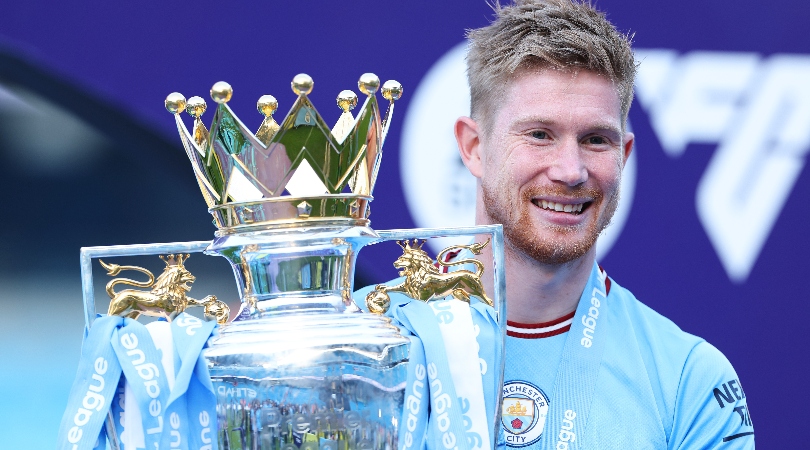Carroll can save the world and other things we learned from Cardiff 0-2 West Ham
The Hammers recorded a vital away win at Cardiff on Saturday. FFT's Huw Davies was there to analyse the action with Stats Zone...

How Big Sam got his groove back
All the talk of late has been of Sam Allardyce losing his mojo. West Ham have come off second best in the crucial six-pointers a Big Sam team usually wins, with a hamstrung defence unable to stop the goals flying in. But if Allardyce's greatest asset has always been to turn a mediocre side into one that can win matches through hard work and sheer bloodymindedness, then it's not left him just yet.
West Ham showed against Cardiff that they can still win games ugly. They made less than half as many passes as the hosts (193 to 409), had fewer shots and shots on target (10 and 3 to 19 and 7) and broke up play with no fewer than 16 fouls all over the pitch, more than double the opposition. There's no need to have more than their 37% of possession if you stay stout in defence and make your chances count, and that's exactly what the Irons did, in true Big Sam style.
In showing a young upstart that doing the simple things is what matters, it was the classic Rocky comeback – he even had Adrian in goal.
Get FourFourTwo Newsletter
The best features, fun and footballing quizzes, straight to your inbox every week.
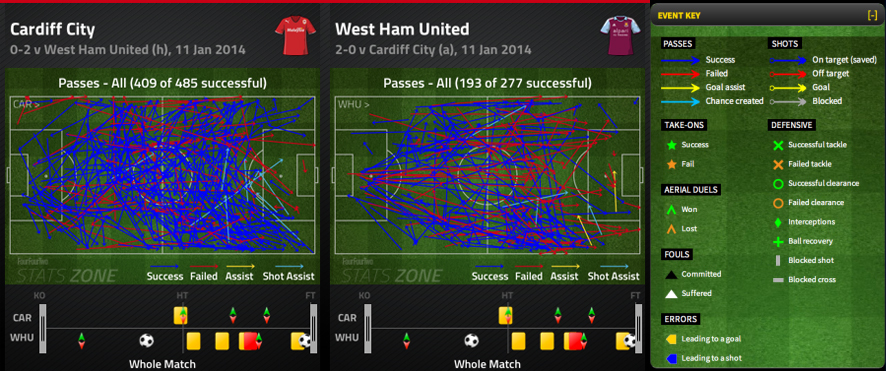
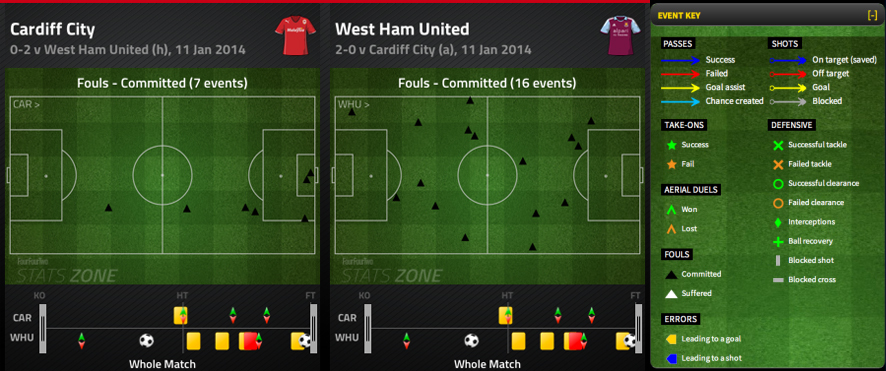
Solskjaer brings passing football down the M4...
Welsh football fans are used to seeing the ball passed out of defence, but at Swansea, not Cardiff (Chris Coleman's Wales build from the back too, only with far less quality). Under Malky Mackay, the Bluebirds were focused on efficiency rather than being easy on the eye. With Ole Gunnar Solskjaer at the helm, however, that looks set to change.
When Cardiff played West Ham at Upton Park on the first day of the season, also succumbing to a 2-0 defeat, goalkeeper David Marshall sent 21 of his 27 passes long, finding a team-mate with only 3 of them and with 9 of his passes in total. That's one-third. When the two sides met again, but with Solskjaer and not Mackay managing his first Premier League match, the keeper's pass completion was 76%, the vast majority going to centre-backs Mark Hudson and Steven Caulker (in comparison, opposite number Adrian passed most regularly to Carlton Cole and Andy Carroll).
The effect was that Cardiff's defenders brought the ball forward, explaining the decision to play club captain Hudson – who has sat unused on the bench for every other league game – ahead of Ben Turner, as Hudson is a better passer. Both Hudson and Caulker were able to contribute to attacks, though this was due in part to the visitors backing off; in fact, Kim Bo-Kyung's deflected shot across the bar came from their retreat.
Bluebirds supporters should probably expect to see more of Hudson and less of Turner going forward, in both senses of the phrase. Alternatively, Solskjaer may be on the lookout for a ball-playing centre-back.
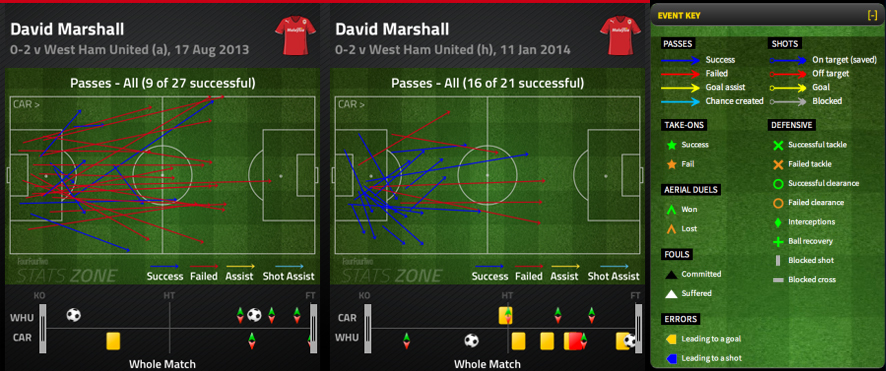
...but not when it matters most
With 20 minutes remaining, James Tomkins was sent off for the visitors. Cardiff had an extra man in their quest to find a vital equaliser and perhaps even a winner. But while the hosts did surge forward, which got the crowd going, the final stages saw more aerial skirmishes than clear-cut opportunities. Danish targetman Andreas Cornelius had come on shortly after the red card and the game plan was evidently to plant the ball onto his sizeable (if shapely) forehead.
West Ham, packing the box, dealt with the threat well. Prior to Tomkins' dismissal, Cardiff found a team-mate with a creditable 10 out of 24 crosses. After it, that figure was 1 from 14, Cornelius missing a headed chance from the successful ball in.
Cornelius having that chance would suggest Solskjaer's idea was a good one, but reducing a contest to a series of aerial duels isn't really playing the numbers, especially when you're turning a situation weighted in your favour – having an extra man – to one featuring just two of your own players up against half a dozen defenders.
Instead of drawing players out of position Cardiff allowed West Ham to continually clear the ball, and in the end super-sub Solskjaer's decision to bring on Cornelius for Hudson – an extremely attacking swap – rendered Cardiff predictable and ineffective when they needed a goal most.
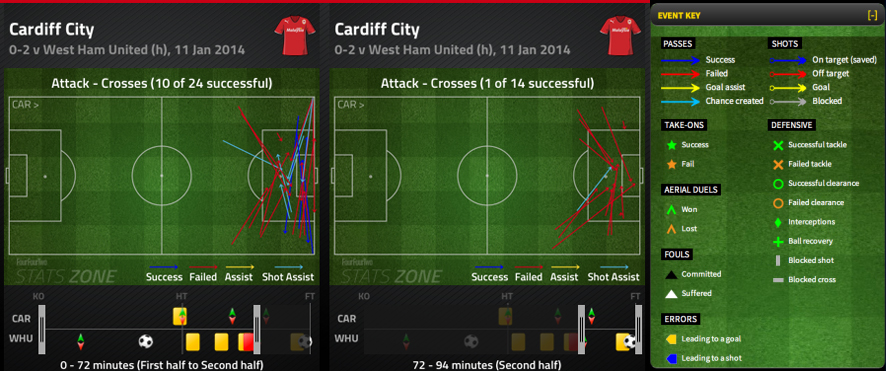
Andy Carroll can save the world (or at least West Ham)
Towering, long of hair and furry of beard, there was a touch of Christ's Second Coming about Andy Carroll's emergence for the final 20 minutes, and travelling Hammers certainly welcomed him that way. And while Cardiff's own AC9 struggled to make an impact, the England striker did what was necessary for his team as they battled to hold onto the lead.
Carroll cut a very lonely figure in Cardiff's half but his presence kept Cardiff's defenders honest and gave his own defenders an outlet. He won headers, held up the ball, made interceptions and even contributed the assist for Mark Noble's injury-time result-sealer.
Carlton Cole started the game and, to his credit, he scored an important goal and showed the impressive strength for which he's known. But he won only 5 of his 13 aerial duels and committed 5 fouls – though, staggeringly, he wasn't booked. Maybe that's an achievement in itself.
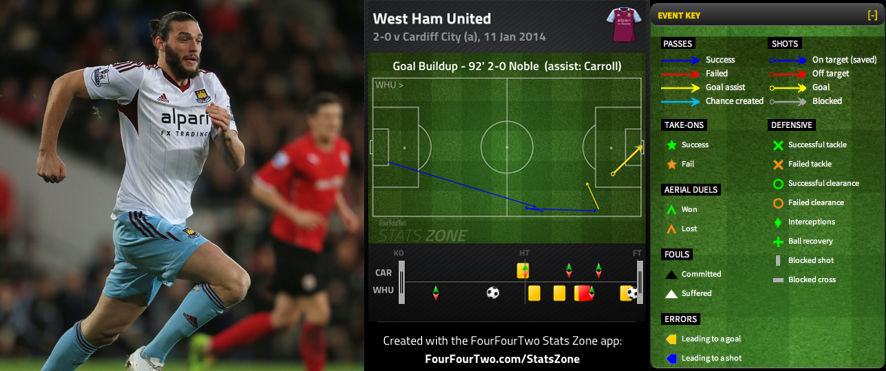
This may be the end for Peter Whittingham
Whittingham has been an excellent servant for Cardiff City, making more than 300 appearances since joining them from Aston Villa and being one of the Championship's most consistent performers for several seasons.
Unfortunately, since returning to the Premier League after seven years away, the star turns have become few and far between (with nods to his equalising and winning goals against Hull and West Bromwich Albion), and on Saturday he played 25 minutes alongside the man who may replace him: Magnus Wolff Eikrem.
Solskjaer switched Mackay's lopsided 4-3-3 formation for a more standard 4-2-3-1, replacing one of Mackay's standard three midfielders with another attacking option. Eikrem and Whittingham made up the more defensive-minded duo once Gary Medel went off, but you suspect there is only one place for the two of them, as Medel is a key player and Cardiff sorely missed the physicality of the injured Jordon Mutch. The 22-year-old Mutch is, after all, an inferior Yaya Toure, and look how Roger Johnson coped with him.
If Solskjaer does persist with this system (though Kim's lacklustre performance brings that into question) Whittingham may find himself replaced by Eikrem, who offers the same incisive passing – and faster, as Whittingham spread the ball well against West Ham yet often slowed attacks – but also a firmer defensive presence. Cardiff failed with over half of their attempted tackles, a deeply worrying statistic, and the deep-lying Whittingham succeeded with none of his. Changes may be afoot.
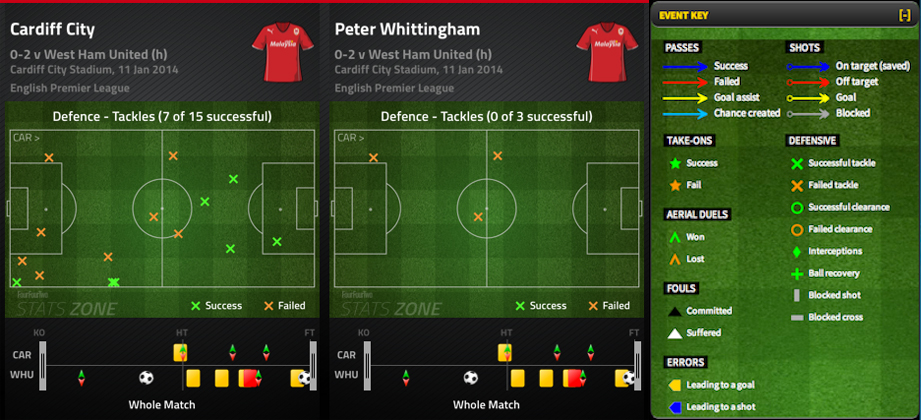
Huw was on the FourFourTwo staff from 2009 to 2015, ultimately as the magazine's Managing Editor, before becoming a freelancer and moving to Wales. As a writer, editor and tragic statto, he still contributes regularly to FFT in print and online, though as a match-going #WalesAway fan, he left a small chunk of his brain on one of many bus journeys across France in 2016.
